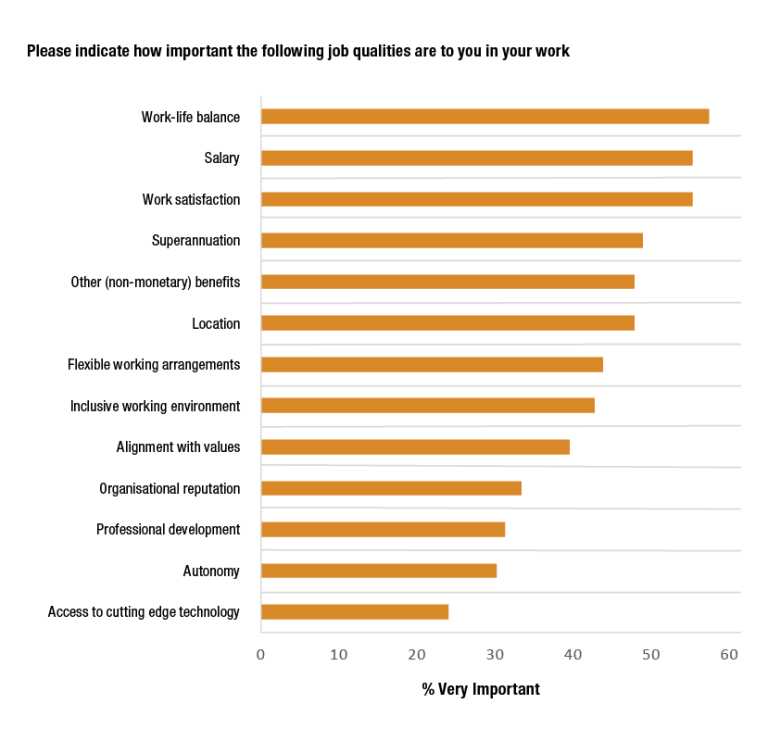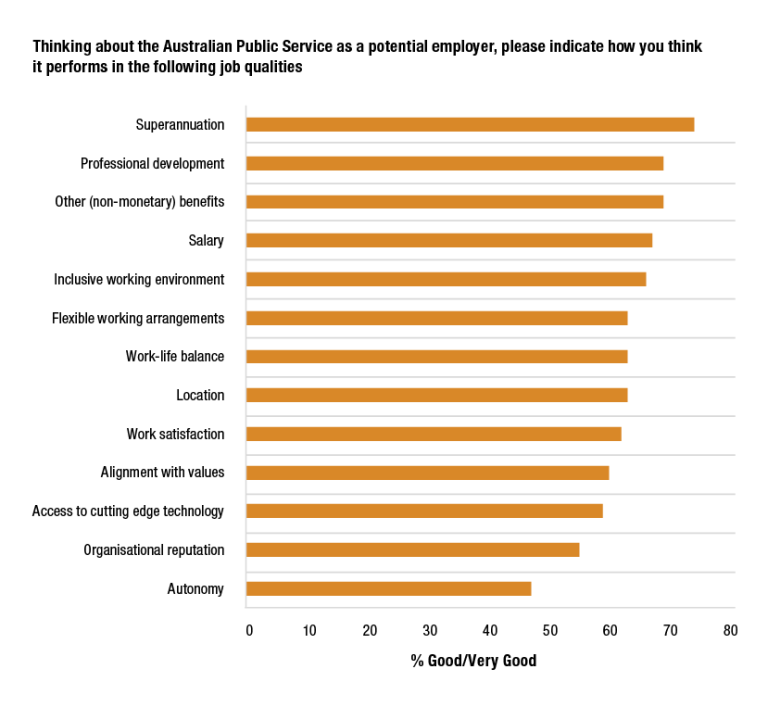7.7 Employee value proposition
Drawing on the themes explored in this chapter, the APS is acting to best position itself for the future of work. The APS is not unique in its experience and challenges. With an increasingly competitive labour market, skills shortages are being seen across the economy and private and public sectors alike are having to adapt quickly to secure talent.
This means the APS must continue to hone and refine its employee value proposition and meet employee expectations. How the APS attracts and retains talent over the coming years will directly impact on its ability to best serve all Australians. The Future of Work Sub-committee is exploring ways to integrate its findings and opportunities throughout its program of work to develop the best value proposition for the APS in the competitive employment market.
An employee value proposition is a set of attributes that employees perceive as the value they gain through employment with an organisation.[61] A strong, authentic employee value proposition is critical to attracting, retaining and developing the workforce that the APS needs now and into the future.
The pillars of the APS employee value proposition centre around the employment factors important to most APS employees. Research suggests, however, that the level of importance varies across workforce segments and employee demographics and may be influenced by the stages of employees’ professional and personal lives. Examples of this include:
- superannuation tends to be more important for older employees
- work-life balance and access to flexible working arrangements tends to be more important for employees with caring responsibilities
- professional L&D tends to be more important for graduates.
Further insights from the 2022 Future of Work Taskforce Survey for APS New Starters showed that 81% of respondents said job security was an important attraction factor, followed by the job offered a good match with the skills (80%) and the nature of the work (74%). Not surprisingly, respondents who did not feel their expectations had been met by the reality of their experience in the APS showed a greater intention to leave the service.
The Survey of Trust in Australian Public Services, conducted in June 2022, also explored the job qualities important to individuals in their work. Just over half (55%) of respondents indicated that work-life balance and salary was very important. Work satisfaction was also considered very important for over half of the respondents (53%) (Figure 7.4).
Figure 7.4: Importance of job qualities (2022)

Source: 2022 PM&C Survey of Trust in Australian public services
Figure 7.5: APS perceived job quality performance (2022)

Source: 2022 PM&C Survey of Trust in Australian public services
APS employees also want more flexibility, a greater sense of purpose and more inclusive workplaces. The APS is taking a step in the right direction. Larger proportions of respondents to the 2022 APS Employee Census indicated that their job inspired them (61% in 2022 compared to 56% in 2021) and that they believed strongly in the purpose and objectives of the APS (85% in 2022; 82% in 2021).
These insights – as well as public perceptions of the APS (Figure 7.5) – are being used to develop an APS employee value proposition and an APS-wide approach to flexibility. This will be considered by the Future of Work Sub-committee before being trialled more broadly for release in 2023.
Figure 7.6: Future of Work Sub-committee of Secretaries Board
Aim: to be a catalyst in driving organisational and workforce reform priorities for the APS,
that meet the Government’s expectations that the APS is a model employer and has the
capability it needs to do its job well.
| APS Reform Plan Priority 3: The APS is a model employer | ||
| APS employee value proposition
Develop and communicate a strong value proposition for the APS, underpinned by a clear purpose statement, to attract and retain APS employees. |
||
| APS wide approach to flexible work:
Develop an APS position that captures the best of flexible work arrangements while still ensuring all employees can continue to learn by doing and seeing, building networks and being part of their workplace. |
||
| Reduce reliance on contractors and consultants
Complete the Audit of APS employment to understand how the external workforce is used across the service and deliver a strategic commissioning framework and in-house consulting model to build core capabilities and rebalance the workforce over time. |
||
| Attract and retain in-demand workers and other specialists:
Strengthen APS processes to secure in-demand workers and progress broader work to better support, recognise and utilise specialists as part of Hierarchy and Classification reforms. |
||
| APS location strategy and action plan:
Support agency decisions on the geographic distribution of the workforce to access diverse talent pools, overcome barriers to the APS going where the talent is and strengthen the APS value proposition by supporting flexible ways of working. |
||
| Performance, productivity and flexible work:
Development of a measurement methodology and framework, which measures the direct impact of flexible working arrangements on organisational performance and productivity in the Department of Home Affairs. |
||
| Pilot: hiring practices:
Pilot best-practice approaches to recruitment to recruit and attract high-performing employees with diverse and emerging skills. |
||
| Reskilling:
Develop and pilot tools and resources to support reskilling and upskilling of employees to meet emerging skills needs. |
| APS Reform Plan Priority 4: The APS has the capability it needs to do its job well | ||
| Capability reviews:
Undertake an initial tranche of Agency Capability Reviews to embed a culture of continuous improvement and to ensure that the APS is building and maintaining the right capabilities to respond to challenges now and into the future. |
||
| Hierarchy and classification reforms:
Accelerate reforms to APS culture and capability, and modernise APS structures and ways of working within the current classification system. |
||
| Performance management:
Establish measures to ensure performance management in the APS is focused on outcomes and behaviours and aligned to APS values. |
||
| International (Asia-Pacific) strategic knowledge:
Develop a pilot program to build Asia and the Pacific capability to build a workforce with deep experience in and knowledge of our region. |
||
| Pilot: H&C managerial capability uplift:
Develop a pilot program to build Asia and the Pacific capability to build a workforce with deep experience in and knowledge of our region. |
||
| Uplift specialist capability, expand and mature professions:
Support ongoing delivery of APS professions and the development of the professions model, including options to establish Evaluation and Project Management professions and support the ongoing delivery of the existing professions and the professions model. |
||
| Pilot: Data and digital campuses:
Establish campuses to attract people wanting a career change and students in Darwin, Newcastle, Launceston and Townsville to skill up in data and digital roles in the APS while remaining at home in their communities. |
Footnotes
[61] Gartner, Gartner Glossary: Employee Value Proposition, n.d., 2022.



